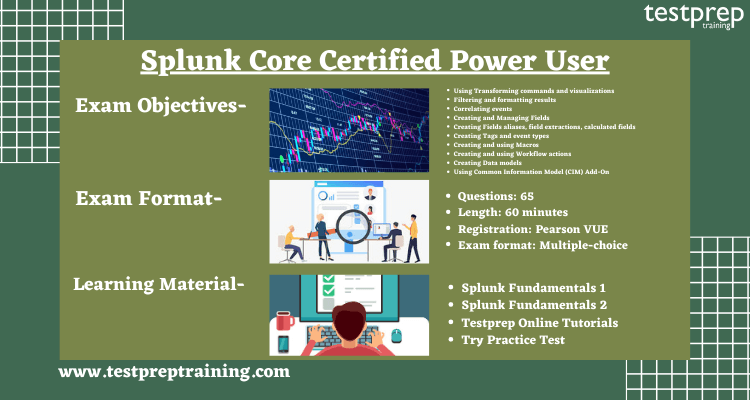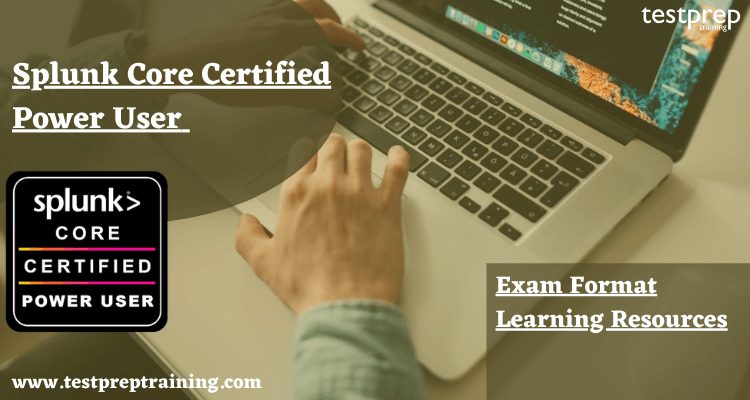A Splunk Core Certified Advanced Power User has a greater depth of knowledge and skills in complex searching and reporting commands, advanced use cases of knowledge objects, and best practices for building dashboards and forms. The Splunk Core Certified Power User is an entry-level certification exam that shows the candidate’s ability to drive and use the Splunk software. The certification provides the candidate a basic understanding of the SPL searching and reporting unit.
The candidate will be experienced to create knowledge articles, use field aliases, build tags and event types, practicing macros, design workflow actions and data models, and normalize data with the Common Information Model in each the Splunk Enterprise or Splunk Cloud platforms. Moreover, this Splunk Core Certified Power User certification also introduces the candidate to Splunk’s datasets feature and Pivot interface.
The Splunk Core Certified Power User exam is the final step towards completion of the Splunk Core Certified Power User certification. This exam is highly recognised and offers you the following benefits:
- Validate Skills
- Enhances Employability
- Enhance Academic Records
- Higher Salaries
- Digital Banking
Reasons to Choose Splunk!
First and foremost, there are two things the candidate need to know that will encompass all the reasons why they should go for Splunk certifications –
- Firstly, Splunk has been the best valued and trusted ecosystem in the industry. Adding to that, it has brilliant investigative abilities, intuitive visualizations, and seamless collaboration. These characteristics will, therefore, help the candidate function their work in the modern world as well as digitize.
- Also, it’s one of the leading brands because it can work with any structure, source, timescale, insight, and action. This is because it has a great capacity to store data from anywhere and any device. Moreover, they also have smart ML/AI at your service to get insights, the candidate can stream their old records as well as the new ones within seconds. Also, it supports a spectacularly broad range of users, business partners can work smoothly and securely.
Exam Format and Scheduling
The Splunk Core Certified Power User exam which has a code SPLK-1002 is the final step towards completion of the Splunk Core Certified Power User certification. This next-level certification exam is a 57-minute, 65-question assessment that evaluates a candidate’s knowledge and skills of field aliases and calculated fields, creating tags and event types, using macros, creating workflow actions and data models, and normalizing data with the CIM.
- Candidates can expect an additional 3 minutes to review the exam agreement, for a total seat time of 60 minutes. It is recommended that candidates for this certification complete the lecture, hands-on labs, and quizzes that are part of the Splunk Fundamentals 2 course in order to be prepared for the certification exam. Splunk Core Certified Power User is a required prerequisite to the Splunk Enterprise Certified Admin certification track.
The splunk certification exams can be taken in either of the following ways-
- Firstly, In-person at a Pearson Test Center.
- Or at home via online proctoring
Register the Exam: Splunk Core Certified Power User
The Splunk Core Certified Power Use can be registered by following the steps-
- First-time registrants need to connect their Splunk account to the Pearson VUE platform.
- Additionally, the candidate will have to submit complete, accurate contact information to testing partner Pearson VUE.
- Then, they need to wait for the Authorization to Test email from Pearson View for two days from their form submission.
- Subsequently, create an account with Pearson VUE.
- Further, the candidate needs to schedule an exam appointment. Their Pearson VUE Home screen provides a full list of exams for which they are eligible. Click through the verification screens and proceed to Schedule this Exam, followed by Proceed to Scheduling.
- Further, they need to verify exam appointment details and confirm contact information. Agree to policies (please read carefully). Enter payment information (or Voucher code, if applicable). Submit Order.
- Lastly, the candidate will receive a registration confirmation email from Pearson VUE.
Course Structure: Splunk Core Certified Power User
Getting to know about the exam objectives will provide you an insight into the exam. Moreover, you will be able to align yourself more deeply with the major objectives of the exam. So, let us take a look:
Using Transforming commands and visualizations – 5%
- Firstly, using the chart command (Splunk Documentation: Chart)
- Also, using the time chart command (Splunk Documentation: time chart, time chart command examples)
Filtering and formatting results – 10%
- The eval command (Splunk Documentation: eval, eval command examples)
- Also, using the search and where commands to filter results (Splunk Documentation: search command
- Moreover, the fillnull command (Splunk Documentation: fillnull)
Correlating events – 15%
- Identify transactions (Splunk Documentation: transaction)
- Additionally, group events using fields (Splunk Documentation: Classify and group similar events)
- Group events using fields and time
- In addition, searching with transactions (Splunk Documentation: Search for transactions)
- Also, reporting on transactions
- Moreover, determining when to use transactions vs. stats (Splunk Documentation: transaction vs stats commands)
Creating and Managing Fields – 10%
- Performing regex field extractions using the Field Extractor (FX) (Splunk Documentation: Build field extractions with the field extractor)
- Next, performing delimiter field extractions using the FX (Splunk Documentation: Field Extractor: Select Method step)
Creating Fields aliases, field extractions, calculated fields – 10%
- Describing, creating, and using field aliases (Splunk Documentation: Create field aliases in Splunk Web, Configure field aliases)
- Further, describing, creating, and using calculated field (Splunk Documentation: Create calculated fields with Splunk Web)
Creating Tags and event types – 10%
- Create and use tags (Splunk Documentation: Tag event types)
- In addition, describing event types and their uses (Splunk Documentation: About event types)
- Then, creating an event type
Creating and using Macros – 10%
- Firstly, describing macros (Splunk Documentation: Define search macros in Settings)
- Secondly, creating and using a basic macro (Splunk Documentation: Use search macros in searches)
- Also, defining arguments and variables for a macro (Splunk Documentation: Define search macros in Settings)
- Lastly, adding and using arguments with a macro (Splunk Documentation: Use search macros in searches)
Creating and using Workflow actions – 10%
- Describe the function of GET, POST, and Search workflow actions (Splunk Documentation: About workflow actions in Splunk Web)
- Create a GET workflow action (Splunk Documentation: Set up a GET workflow action)
- In addition, creating a POST workflow action (Splunk Documentation: Set up a POST workflow action)
- Moreover, create a Search workflow action (Splunk Documentation: Set up a search workflow action)
Creating Data models – 10%
- Describe the relationship between data models and pivot (Splunk Documentation: Work with data models and pivots, About data models)
- Identify data model attributes
- Create a data model (Splunk Documentation: datamodel)
Using Common Information Model (CIM) Add-On – 10%
- Describe the Splunk CIM (Splunk Documentation: Splunk Common Information Model)
- List the knowledge objects included with the Splunk CIM Add-On (Splunk Documentation: Add-ons and CIM, Access knowledge objects for an add-on)
- Use the CIM Add-On to normalize data (Splunk Documentation: Use the CIM to normalize data at search time)
Learning Resources to Check out!
For your convenience, I’m mentioning some helpful learning resources which the candidate can refer to! The preparations for any exam demand consistency and utter determination. The candidate should look at the following pointers:

- Splunk Fundamentals 1– The Splunk Fundamental 1 is a self-paced course that teaches you how to search and navigate in Splunk, use fields, get statics from your data, create reports, dashboards, lookups, and alerts. Moreover, it will also introduce you to Splunk’s dataset features and Pivot interface.
- Splunk Fundamentals 2– This 4 virtual-day course focuses on additional SPL commands, using field aliases and calculated fields, creating tags and event types. Further, it also includes using macros, creating workflow actions and data models, and normalizing data with the CIM.
- Testprep Online Tutorials– Splunk Core Certified Power User Online Tutorial enhance your knowledge and provide a depth understanding of the exam concepts. Additionally, they also cover exam details and policies. Nonetheless, these online tutorials provide and in-depth information related to the examination. This in turn will help you prepare well for the examination. Therefore learning with Online Tutorials will result in strengthening your preparation.
- Try Practice Test– Practice tests are the one who ensures the candidate about their preparation. The practice test will help the candidates to acknowledge their weak areas so that they can work on them. There are many practice tests available on the internet nowadays, so the candidate can choose which they want. We at Testprep training also offer practice tests which are very helpful for the ones who are preparing.
Expert Corner
That is to say, successfully passing the Splunk Core Certified Power User exam will help the candidate to get certified and also provide them with many high-level opportunities. In order to pass, there are various training solutions that provide study guides, online self-study tools, and courses to cover everything for the Splunk exam. So, get some hands-on knowledge and start preparing for the Splunk Core Certified Power User exam.



